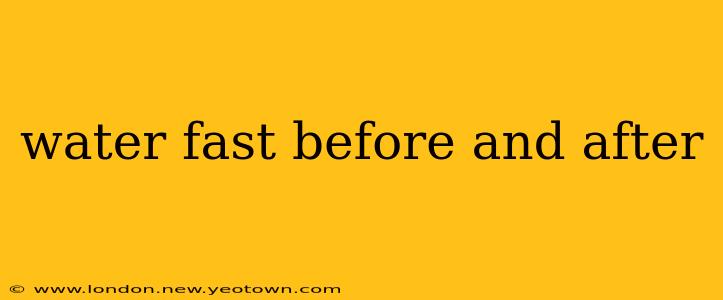Water fasting, the practice of consuming only water for a defined period, has gained popularity as a potential tool for weight loss, detoxification, and improved health. However, it's crucial to understand the significant implications before, during, and after undertaking a water fast. This comprehensive guide explores the essential preparations, potential benefits and drawbacks, and the crucial recovery phase. Always consult your doctor before starting any water fast, especially if you have pre-existing health conditions.
Before You Begin: Preparation is Key
The success and safety of a water fast hinge on proper preparation. Rushing into it can lead to adverse effects. Here's what you need to consider:
1. Consult Your Physician:
This cannot be stressed enough. Individuals with certain medical conditions, such as diabetes, heart problems, eating disorders, or those taking specific medications, should absolutely not attempt a water fast without medical supervision. Your doctor can assess your suitability and advise on potential risks.
2. Gradual Reduction in Caloric Intake:
Don't jump straight into a water fast. Ease your body into the process by gradually reducing your calorie intake for a few days leading up to the fast. This helps minimize the initial shock to your system.
3. Hydration is Paramount:
Start increasing your water intake several days before your fast. Proper hydration is essential throughout the entire process. Aim for at least eight glasses of water daily.
4. Electrolyte Balance:
Electrolyte depletion is a common concern during water fasting. Consider adding electrolyte supplements to your water intake in the days leading up to and during the fast, especially if you experience significant fatigue or muscle cramps. However, always consult your doctor before introducing supplements.
During the Water Fast: Monitoring Your Body
While fasting, pay close attention to your body's signals. Listen to your body and adjust accordingly.
1. Listen to Your Body:
Rest is crucial. Expect some fatigue, headaches, and potential lightheadedness in the initial days. If you experience severe symptoms like intense weakness, dizziness, or palpitations, stop the fast immediately and consult a medical professional.
2. Gentle Movement:
Light exercise, such as walking, can be beneficial, but avoid strenuous activity. Your body needs rest to focus on the fasting process.
3. Mental Well-being:
The mental aspect is often overlooked. Water fasting can impact mood. Employ stress-reducing techniques like meditation or mindfulness exercises.
4. Hydration and Electrolyte Support:
Continue drinking plenty of water. You may wish to use electrolyte supplements to prevent depletion. Remember to consult your doctor before using any supplements.
After the Water Fast: The Crucial Recovery Phase
Breaking a fast improperly can undo any potential benefits and lead to discomfort. A gradual reintroduction of food is paramount.
1. Gradual Reintroduction of Food:
Begin with easily digestible foods like clear broths, fruit juices (diluted), or light vegetable soups. Avoid heavy, processed foods in the first few days.
2. Listen to Your Digestive System:
Pay attention to your body's signals. If a food causes discomfort, remove it from your diet. Slowly reintroduce solid foods over several days.
3. Hydration Remains Crucial:
Continue to drink plenty of water, even after breaking your fast.
4. Nutritional Support:
Consider adding nutrient-rich foods like fruits, vegetables, and lean protein gradually into your diet.
5. Post-Fast Check-up:
Consider a follow-up appointment with your physician to assess your overall health after the fast.
Potential Benefits and Risks of Water Fasting
While some people report benefits such as weight loss and improved blood sugar levels, it's vital to acknowledge the risks. The benefits are often temporary, and the risks can be serious. This isn't a sustainable long-term strategy for weight management. Water fasting should be undertaken only under strict medical guidance. This is not a substitute for a healthy diet and exercise regime.
Disclaimer: This information is for educational purposes only and is not intended as medical advice. Always consult with a healthcare professional before starting any water fast or making changes to your diet or exercise routine.

